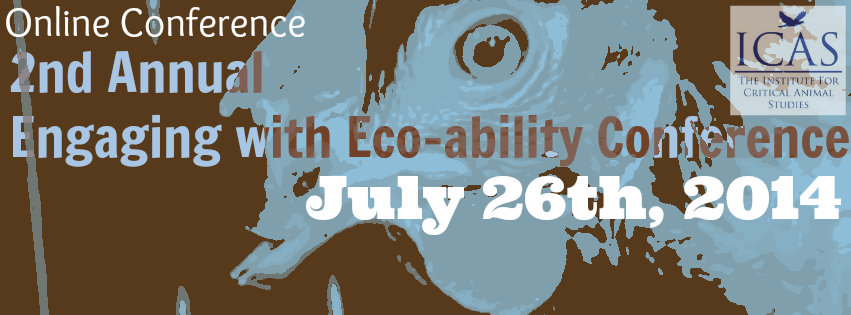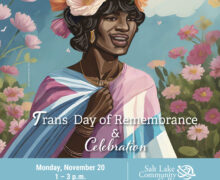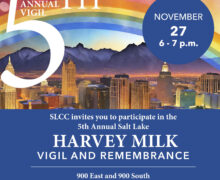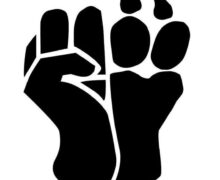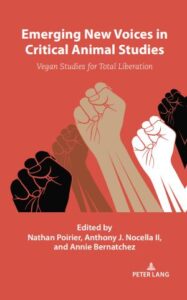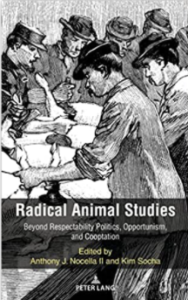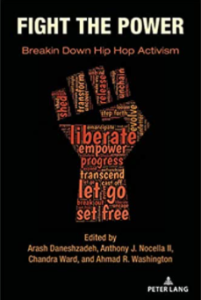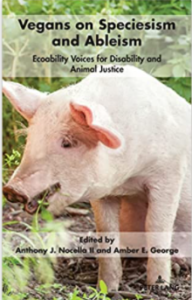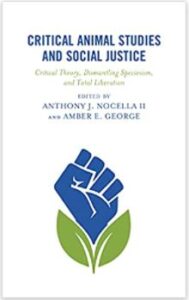2nd Annual Engaging with Eco-ability Conference July 26, 2014 – Call for Presentations
The 2nd Annual “Engaging with Eco-ability”Conference is designed to further the exploration into the intersection between disability studies, critical animal studies, and ecocriticism. This conference will be hosted entirely online, on July 26th, 2014. The conference is sponsored by the Institute for Critical Animal Studies and aims to broaden the depth of work currently taking place within its Intersectional Research Collaborative on Disability and Age chaired by Dr. Gregor Wolbring. Last year’s conference was used in order to form the basis for a special issue on eco-ability that was recently published in the Journal for Critical Animal Studies. Our hope is that this year’s conference will form the basis for a future publication as well.
Call for Papers
“Engaging with Eco-ability”
2nd Annual Conference
July 26th, 2014
TO SUBMIT A PROPOSAL: Send an e-mail to ecoability@gmail.com with an abstract of approximately 300 words of your proposal for the conference. Please include a short biography of yourself of approximately 100 words. Proposals will be accepted on a rolling basis, but are due by NO LATER THAN July 11th, 2014.
We are looking for papers and presentations concerning, but not limited to, the following topics:
- Eco-Ability Intersectional Theories – We are looking for intersectional innovative liberatory theories between dis-ability studies, environmental ethics, critical animal studies, queer studies, critical race theory, transnational feminism, and other radical theories that promote activism.
- Activist Stories of exclusion of people with dis-abilities in the animal advocacy movement – What are the problems within the animal advocacy/liberation movement that create tension with dis-abled advocates? How can these problems be resolved? What animal advocacy campaigns, projects, events, protests, language, programs, organizations, theories, and practices are exclusionary and ableist to those with dis-abilities?
- Activist Stories of exclusion of animal advocacy/liberation in the dis-abilities rights movement – How are animal advocates excluded from discussion within dis-ability rights movement? How can these exclusions be resolved? What effective routes of activism can we take to create more effective coalitions between these two struggles? What dis-ability rights campaigns, projects, events, protests, language, programs, organizations, and practices are exclusionary and speciesist to those involved in the animal advocacy movement?
- Critiques of Service Nonhuman Animals and Animal Testing/Vivisection – Vivisection and service nonhuman animals are often touted as the “cure” for people with dis-abilities. What does it mean to try to “cure” dis-ability? Is what science does, such as testing on nonhuman animals, while searching for “cures” worth the cost? What is our responsibility to nonhuman animals in relation to people with dis-ability and vice versa?
- Activist stories of being included or excluded from the animal, dis-ability, and environmental movements – What are the problems within the animal, dis-ability, and environmental movements that creates tension between the different movements and advocates? How can these problems be resolved? How are these problems being solved? What animal, Earth, and dis-ability campaigns, projects, events, protests, language, programs, organizations, theories, and practices are exclusionary?

